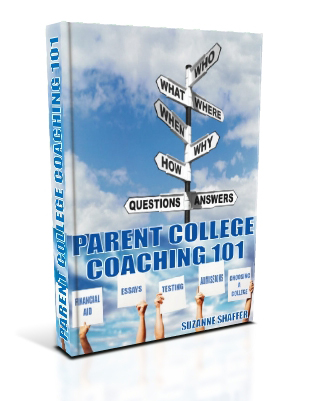Sign up for my FREE parent tips email and get my FREE Ebook on college financing! Or subscribe to my blog on the left and get email updates.
Wednesday’s child may be full of woe but Wednesday’s Parent can substitute action for anxiety. Each Wednesday Wendy and I will provide parent tips to get and keep your student on the college track. It’s never too late or too early to start!
Wednesday’s Parent will give twice the info and double the blog posts on critical parenting issues by clicking on the link at the end of the article from pocsmom.com to parentingforcollege and vice versa.
______________
5 Tips to Help with Application Stress
A study conducted in 2010 of high school and college students found that “five times as many high school and college students are dealing with anxiety as youth of the same age who were studied in the Great Depression era. Students themselves point to everything from pressure to succeed — self-imposed and otherwise — to a fast-paced world that’s only sped up by the technology they love so much.”
If they were to do the same study today, I would imagine they would find the level of stress and pressure students feel has escalated. There is no greater stress than application stress. Every component breeds stress: standardized tests, GPAs, the essay, and even the recommendation letters. It’s no wonder students are feeling the stress when they start the application process.
As a parent, it’s difficult for you to watch the stress levels increase as it gets closer to application time. And when stress levels increase with your student, the family stress goes up as well.
Following are 5 tips to help with application stress:
Preparation prevents panic
I used to tell my kids that I worked best under pressure. It may be true but with the pressure came added stress. As with any task, preparation removes the stress and allows you and your student to avoid the panic that ensues and causes stress.
Get help before you need it
Before senior year, do your research. If you find there are some questions that you need answered or some help with the overwhelming amount of components in the application, get help. Help is available online and a good bit of it is either free or at a minimal cost. There are also other parents who are going through this or have been through it before and are willing to help. Ask for help–don’t flounder around when help is available.
Stay organized
Organization is key when tackling the college application. Look at the college sites and the Common App site for a list of application components. Gather all the necessary documents before starting and keep them in one place (either on the computer or in a folder). Use calendars, to-do lists, and emails to keep all the documents organized. Once your student starts with the application they should be able to complete it easily.
Continue reading Wednesday’s Parent: 5 Tips to help with application stress



 It’s no surprise the middle name of college-bound teens is “stress”. According to a recent survey, 76 percent of college-bound students say they are stressed. If you live with one, you’re stressed too; and not just you, but your family as well. Granted, there are plenty of reasons to be stressed. And plenty of reasons why it’s impossible to avoid feeling stress (try as you might).
It’s no surprise the middle name of college-bound teens is “stress”. According to a recent survey, 76 percent of college-bound students say they are stressed. If you live with one, you’re stressed too; and not just you, but your family as well. Granted, there are plenty of reasons to be stressed. And plenty of reasons why it’s impossible to avoid feeling stress (try as you might).









